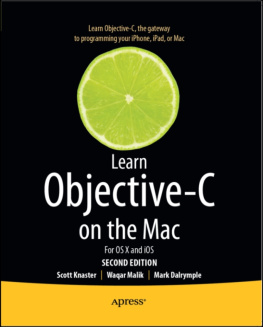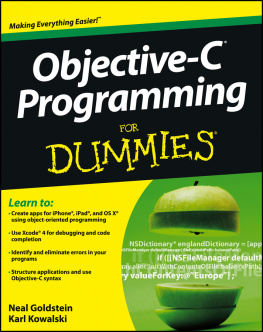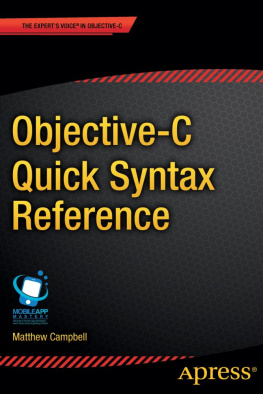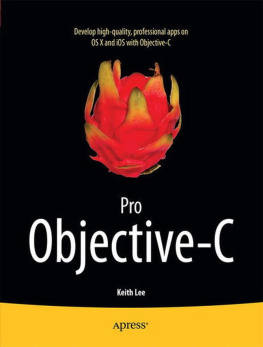Objective-C
Phrase Book
Second Edition
David Chisnall

Upper Saddle River, NJ Boston Indianapolis San Francisco
New York Toronto Montreal London Munich Paris Madrid
Cape Town Sydney Tokyo Singapore Mexico City
Many of the designations used by manufacturers and sellers to distinguish their products are claimed as trademarks. Where those designations appear in this book, and the publisher was aware of a trademark claim, the designations have been printed with initial capital letters or in all capitals.
The author and publisher have taken care in the preparation of this book, but make no expressed or implied warranty of any kind and assume no responsibility for errors or omissions. No liability is assumed for incidental or consequential damages in connection with or arising out of the use of the information or programs contained herein.
The publisher offers excellent discounts on this book when ordered in quantity for bulk purchases or special sales, which may include electronic versions and/or custom covers and content particular to your business, training goals, marketing focus, and branding interests. For more information, please contact:
U.S. Corporate and Government Sales
(800) 382-3419
For sales outside the United States, please contact:
International Sales
Visit us on the Web: informit.com/aw
Library of Congress Cataloging-in-Publication Data is on file.
Copyright 2012 Pearson Education, Inc.
All rights reserved. Printed in the United States of America. This publication is protected by copyright, and permission must be obtained from the publisher prior to any prohibited reproduction, storage in a retrieval system, or transmission in any form or by any means, electronic, mechanical, photocopying, recording, or likewise. For information regarding permissions, write to:
Pearson Education, Inc
Rights and Contracts Department
501 Boylston Street, Suite 900
Boston, MA 02116
Fax (617) 671-3447
ISBN-13: 978-0-321-81375-6
ISBN-10: 0-321-81375-8
Text printed in the United States on recycled paper at RR Donnelly in Crawfordsville, Indiana.
First printing October 2011
Editor-in-Chief
Mark Taub
Acquisitions Editor
Mark Taber
Development Editor
Michael Thurston
Managing Editor
Kristy Hart
Project Editor
Anne Goebel
Copy Editor
Bart Reed
Proofreader
Charlotte Kughen
Publishing Coordinator
Vanessa Evans
Cover Designer
Gary Adair
Senior Compositor
Gloria Schurick
Table of Contents
About the Author
David Chisnall is a freelance writer and consultant. While studying for his PhD, he co-founded the toil project, which aims to produce an open-source desktop environment on top of GNUstep, an open-source implementation of the OpenStep and Cocoa APIs. He is an active contributor to GNUstep and is the original author and maintainer of the GNUstep Objective-C 2 runtime library and the associated compiler support in the Clang compiler.
After completing his PhD, David hid in academia for a while, studying the history of programming languages. He finally escaped when he realized that there were places off campus with an equally good view of the sea and without the requirement to complete quite so much paperwork. He occasionally returns to collaborate on projects involving modeling the semantics of dynamic languages.
David has a great deal of familiarity with Objective-C, having worked both on projects using the language and on implementing the language itself. He has also worked on implementing other languages, including dialects of Smalltalk and JavaScript, on top of an Objective-C runtime, allowing mixing code between all of these languages without bridging.
When not writing or programming, David enjoys dancing Argentine Tango and Cuban Salsa, playing badminton and ultimate frisbee, and cooking.
Acknowledgments
When writing a book about Objective-C, the first person I should thank is Nicolas Roard. I got my first Mac at around the same time I started my PhD and planned to use it to write Java code, not wanting to learn a proprietary language. When I started my PhD, I found myself working with Nicolas, who was an active GNUstep contributor. He convinced me that Objective-C and Cocoa were not just for Macs and that they were both worth learning. He was completely right: Objective-C is a wonderfully elegant language, and the accompanying frameworks make development incredibly easy.
The next person to thank is Fred Kiefer. Fred is the maintainer of the GNUstep implementation of the AppKit framework. He did an incredibly thorough (read: pedantic) technical review of this book, finding several places where things were not explained as well as they could have been. If you enjoy reading this book, then Fred deserves a lot of the credit.
Finally, I need to thank everyone else who was involved in bringing this book from my text editor to your hands, especially Mark Taber who originally proposed the idea to me.
We Want to Hear from You
As the reader of this book, you are our most important critic and commentator. We value your opinion and want to know what were doing right, what we could do better, what areas youd like to see us publish in, and any other words of wisdom youre willing to pass our way.
You can email or write me directly to let me know what you did or didnt like about this bookas well as what we can do to make our books stronger.
Please note that I cannot help you with technical problems related to the topic of this book, and that due to the high volume of mail I receive, I might not be able to reply to every message.
When you write, please be sure to include this books title and author as well as your name and phone or email address. I will carefully review your comments and share them with the author and editors who worked on the book.
E-mail:
Mail: Mark Taber
Associate Publisher
Addison Wesley Publishing
800 East 96th Street
Indianapolis, IN 46240 USA
Reader Services
Visit our website and register this book at informit.com/aw for convenient access to any updates, downloads, or errata that might be available for this book.
Introduction
Blaise Pascal once wrote, I didnt have time to write a short letter, so I wrote a long one instead. This phrasebook is the shortest book Ive written, and trying to fit everything that I wanted to say into a volume this short was a challenge.
When Mark Taber originally suggested that I write an Objective-C Phrasebook, I was not sure what it would look like. A phrasebook for a natural language is a list of short idioms that can be used by people who find themselves in need of a quick sentence or two. A phrasebook for a programming language should fulfil a similar rle.
This book is not a language reference. Apple provides a competent reference for the Objective-C language on the http://developer.apple.com site. This is not a detailed tutorial; unlike my other Objective-C book, Cocoa Programming Developers Handbook, you wont find complete programs as code examples. Instead, youll find very short examples of Objective-C idioms, which hopefully you can employ in a wide range of places.

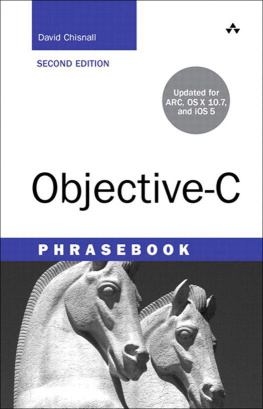

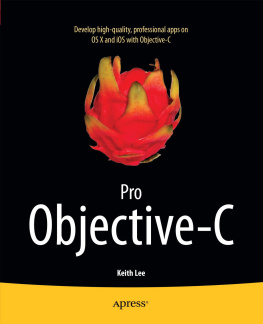
![Robert Clair [Robert Clair] - Learning Objective-C 2.0: A Hands-on Guide to Objective-C for Mac and iOS Developers, Second Edition](/uploads/posts/book/124067/thumbs/robert-clair-robert-clair-learning-objective-c.jpg)
